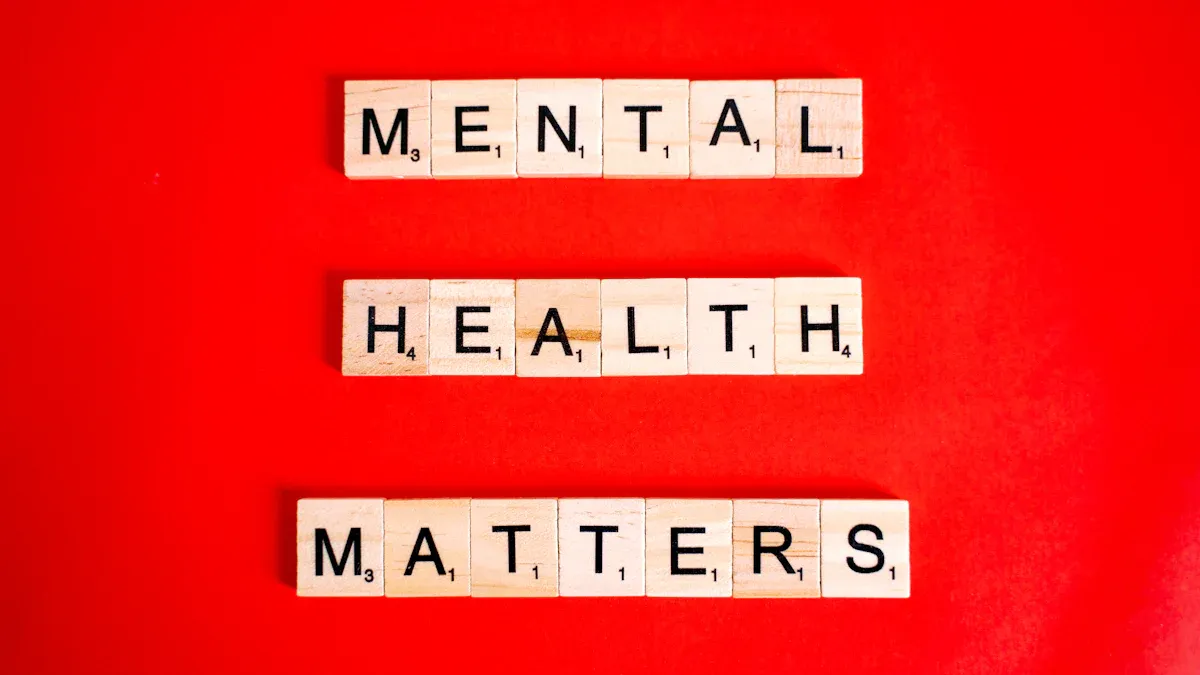Proven Techniques to Manage Chronic Stress Effectively

Chronic stress can feel like a constant weight you can’t shake off. It takes a toll on your mental and physical health, leading to anxiety, depression, and even heart disease. Did you know nearly 75% of Americans experience stress-related symptoms monthly? Managing Chronic Stress: Tips for a Healthy Mind and Body isn’t just about reducing stress—it’s about reclaiming your well-being.
Key Takeaways
Notice signs of long-term stress, like always feeling tired or annoyed. Knowing these signs is the first step to feeling better.
Add mindfulness habits to your daily life. Easy activities like deep breathing or writing in a journal can lower stress and clear your mind.
Stay active with regular exercise. Short walks or yoga can make you happier and handle stress better.
Understanding Chronic Stress

What is Chronic Stress
Chronic stress happens when you feel overwhelmed or under pressure for a long time. It’s not like the occasional stress you might feel before a big test or presentation. Instead, it sticks around and becomes part of your daily life. Over time, this constant stress can harm your body and mind. Studies show that chronic stress can lead to serious health problems like heart disease, strokes, and even brain damage. It also affects how you think, making it harder to focus, remember things, or make decisions.
If you’ve been feeling this way for weeks or months, it’s important to recognize it. Chronic stress isn’t just about feeling tired or worried—it’s a signal that your body needs help.
Symptoms of Chronic Stress
How do you know if you’re dealing with chronic stress? Here are some common signs:
Aches and pains that don’t seem to go away.
Trouble sleeping or feeling tired all the time.
Feeling irritable or snapping at others.
Difficulty concentrating or making decisions.
Avoiding social activities or feeling disconnected from others.
If you notice three or more of these symptoms for several weeks, it might be time to take action. Chronic stress doesn’t just affect your mood—it can impact your entire life.
Effects on Mental and Physical Health
Chronic stress doesn’t just stay in your head. It affects your whole body. Research shows that it can lead to digestive problems, headaches, and high blood pressure. Over time, it weakens your immune system, making you more likely to get sick. Mentally, it can cause anxiety, depression, and even memory problems.
A study on the connection between physical and mental health found that chronic stress increases the risk of heart disease and other illnesses. Another study revealed that prolonged stress can harm your immune and cardiovascular systems, leading to long-term health issues.
Managing Chronic Stress: Tips for a Healthy Mind and Body is essential to avoid these effects. By taking steps to reduce stress, you can protect both your mental and physical health.
Managing Chronic Stress: Tips for a Healthy Mind and Body

Mental Strategies
Your mind is your most powerful tool when it comes to managing chronic stress. One of the best ways to start is by building strong social connections. Did you know that people with solid social support feel less stressed? Spending time with friends or family can actually help your body release hormones that calm you down. Even a quick chat with someone you trust can make a big difference.
Another effective strategy is practicing mindfulness. This means focusing on the present moment instead of worrying about the past or future. Apps like Headspace or Calm can guide you through simple exercises. Journaling is another great option. Writing down your thoughts helps you process emotions and clear your mind.
Physical Techniques
Physical activity isn’t just good for your body—it’s a stress-buster too. Regular exercise improves your mood and helps you cope better with stress. Studies show that activities like yoga, walking, or even dancing can boost your resilience. You don’t need to spend hours at the gym. A 20-minute walk in nature can work wonders.
Relaxation techniques like progressive muscle relaxation are also worth trying. This involves tensing and relaxing different muscle groups to release tension. Research shows it’s especially helpful for older adults, with benefits lasting up to 14 weeks.
Technique | Study Type | Findings |
|---|---|---|
Biofeedback | Systematic Review (2018) | Promising for anxiety and depression in children, but not recommended for clinical use yet. |
Heart Rate Variability (HRV) | Meta-Analysis (2017) | Helpful for reducing self-reported stress and anxiety; promising for future wearable devices. |
Progressive Muscle Relaxation | Systematic Review (2015) | Promising for reducing anxiety and depression in older adults; effects maintained after 14 weeks. |
Lifestyle Changes
Small changes in your daily routine can lead to big improvements in managing chronic stress. Programs like STEP have shown that adopting healthier habits can reduce stress by over 22% in just three months. These changes also help with weight and BMI, which are often linked to stress levels.
Start by prioritizing sleep. Aim for 7-9 hours each night to give your body time to recover. Eating a balanced diet with plenty of fruits, vegetables, and whole grains can also make a difference. Avoid too much caffeine or sugar, as they can increase anxiety.
Finally, set aside time for hobbies or activities you enjoy. Whether it’s painting, gardening, or playing an instrument, doing something you love can help you relax and recharge.
When to Seek Professional Help
Recognizing Unmanageable Stress
Sometimes, stress becomes too much to handle on your own. It’s important to recognize when you might need extra support. Here are some signs that suggest it’s time to seek professional help:
You constantly feel anxious or worried, even about small tasks.
Physical symptoms like headaches, muscle tension, or fatigue occur frequently.
You struggle to concentrate or remember things.
Sleep feels impossible, or you wake up tired despite getting enough rest.
You notice emotional changes, like irritability or feeling helpless.
Work performance drops, and you miss deadlines or lose motivation.
You avoid social interactions or cancel plans often.
You rely on unhealthy habits, like drinking too much coffee or alcohol, to cope.
If you notice several of these signs, don’t ignore them. Chronic stress can spiral into bigger problems without proper care. Reaching out for help is a step toward feeling better.
Types of Professional Support
Professional support can make a huge difference in managing chronic stress. Different approaches work for different people, so it’s important to find what suits you best.
Key Findings | Description |
|---|---|
Effectiveness | Studies show stress management techniques, like biofeedback, can be helpful. |
Population Differences | Patients often benefit more than workers, highlighting the need for tailored care. |
Limitations | Small study sizes and differences in methods can affect how well results apply to everyone. |
Future Research | Larger, standardized studies are needed to improve treatment options. |
Therapists and counselors can guide you through stress management techniques, like cognitive-behavioral therapy (CBT). This method helps you reframe negative thoughts and develop healthier coping strategies. Some people find biofeedback helpful, where you learn to control physical responses like heart rate.
If you’re unsure where to start, consider talking to your primary care doctor. They can recommend specialists or programs that fit your needs. Remember, seeking help isn’t a sign of weakness—it’s a step toward reclaiming your well-being.
Benefits of Managing Chronic Stress
Improved Mental Health
Managing chronic stress can significantly improve your mental health. When you take steps to reduce stress, you’ll likely notice fewer feelings of anxiety and worry. Programs like Cognitive Behavioral Therapy (CBT) and Acceptance and Commitment Therapy (ACT) have shown remarkable results. For example, these therapies reduce relapse rates in addiction recovery by nearly 50%. Mindfulness-Based Stress Reduction (MBSR) programs also help, with participants reporting up to a 38% reduction in stress-related symptoms after just eight weeks.
Stress management doesn’t just ease your mind—it builds resilience. You’ll find it easier to handle emotional challenges and regulate your reactions. Over time, this leads to a more positive outlook and better emotional balance.
Enhanced Physical Well-being
Reducing stress isn’t just about feeling better mentally—it’s also about improving your physical health. Chronic stress can wreak havoc on your body, but managing it can reverse many of these effects. Regular exercise, for instance, boosts your cardiovascular health and releases endorphins, which improve your mood. Mindfulness and meditation lower cortisol levels, helping your body relax and recover.
Other habits, like prioritizing sleep and eating a balanced diet, also play a big role. Sleep gives your body the time it needs to heal, while healthy foods provide essential nutrients to combat stress. Building a support system and engaging in hobbies can also recharge your energy and keep you physically and emotionally strong.
Better Quality of Life
When you manage chronic stress effectively, your overall quality of life improves. You’ll feel more in control of your emotions, your health, and your daily routine. Studies highlight the broad benefits of stress management:
Study Description | Findings |
|---|---|
2021 study in JAMA | Mental stress is a stronger predictor of heart attacks than physical stress, showing the importance of managing mental stress for heart health. |
2019 Swedish study | Individuals with a stress disorder are 37% more likely to develop cardiovascular disease compared to the general population. |
NHS Scotland meta-analysis (2012) | Moderate stress increases mortality risk by 40%, while highly symptomatic stress increases it by over 90%. |
University College London (2017) | Higher cortisol levels correlate with increased obesity, linking stress to weight management. |
University of Southern California (2022) | High stress levels accelerate immune system aging, raising risks for cancer and cardiovascular diseases. |
By managing stress, you can reduce these risks and enjoy a healthier, more fulfilling life. You’ll have more energy, better relationships, and a stronger sense of purpose. Managing Chronic Stress: Tips for a Healthy Mind and Body isn’t just about reducing stress—it’s about creating a life you love.
Understanding chronic stress is key to protecting your mental and physical health. It’s not just about feeling better—it’s about living better. Simple steps like mindfulness or exercise can make a big difference. If stress feels overwhelming, don’t hesitate to seek help. You deserve a healthier, happier life. 🌟
FAQ
What is the fastest way to reduce stress in the moment?
Take deep breaths. Inhale for four seconds, hold for four, and exhale for four. This simple technique calms your mind and body quickly.
Can stress ever be good for you?
Yes! Short-term stress can motivate you to meet deadlines or solve problems. Chronic stress, though, harms your health and needs proper management.
How long does it take to see results from stress management techniques?
It depends on the method. Mindfulness or breathing exercises can help immediately. Long-term habits like exercise or therapy may take weeks to show noticeable changes.
See Also
Exploring Adrenocortical Adenoma: Symptoms And Treatment Options
Key Insights Into Symptoms Of Adrenocortical Carcinoma
Symptoms And Treatment Approaches For Large Granular Lymphocytic Leukemia
Lymphomatoid Granulomatosis: Symptoms And Treatment Explained

